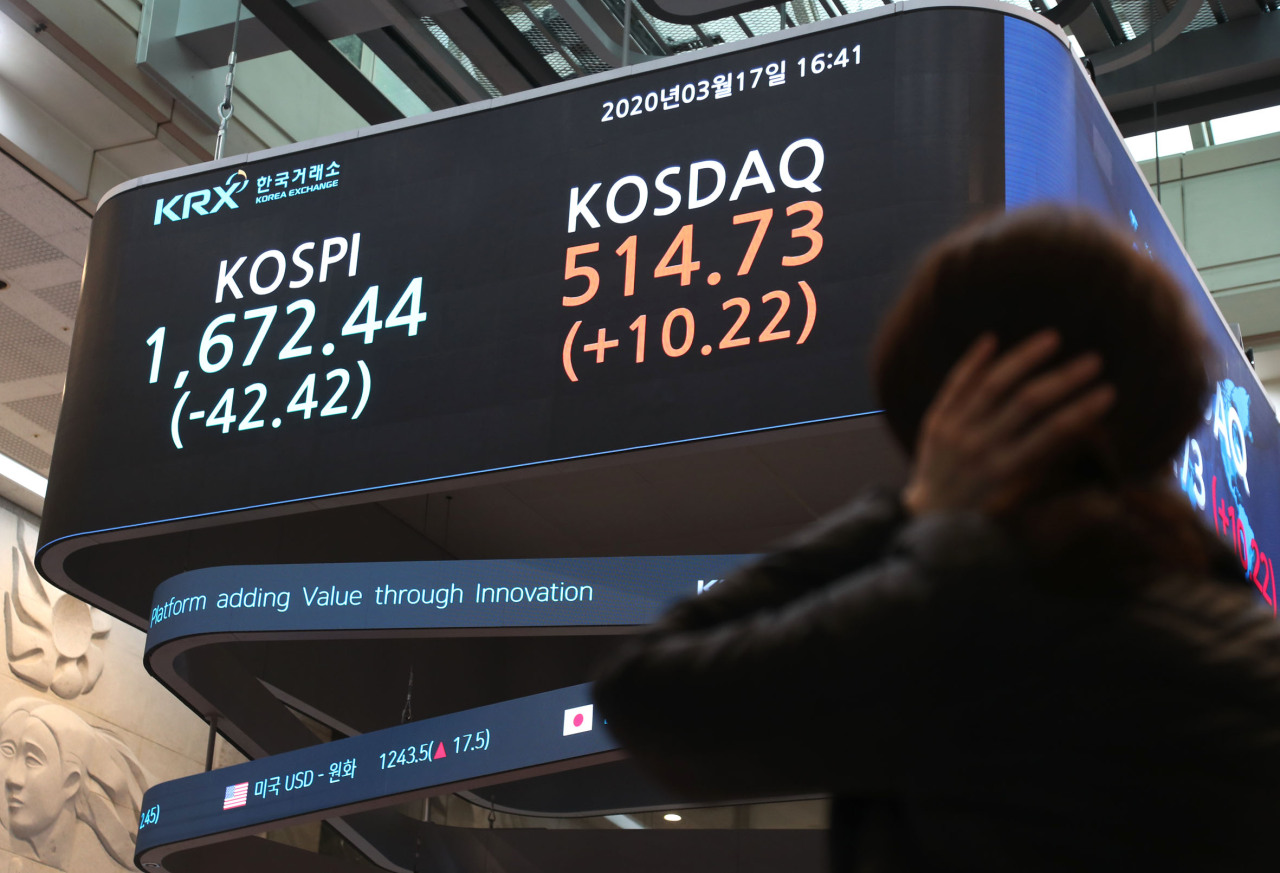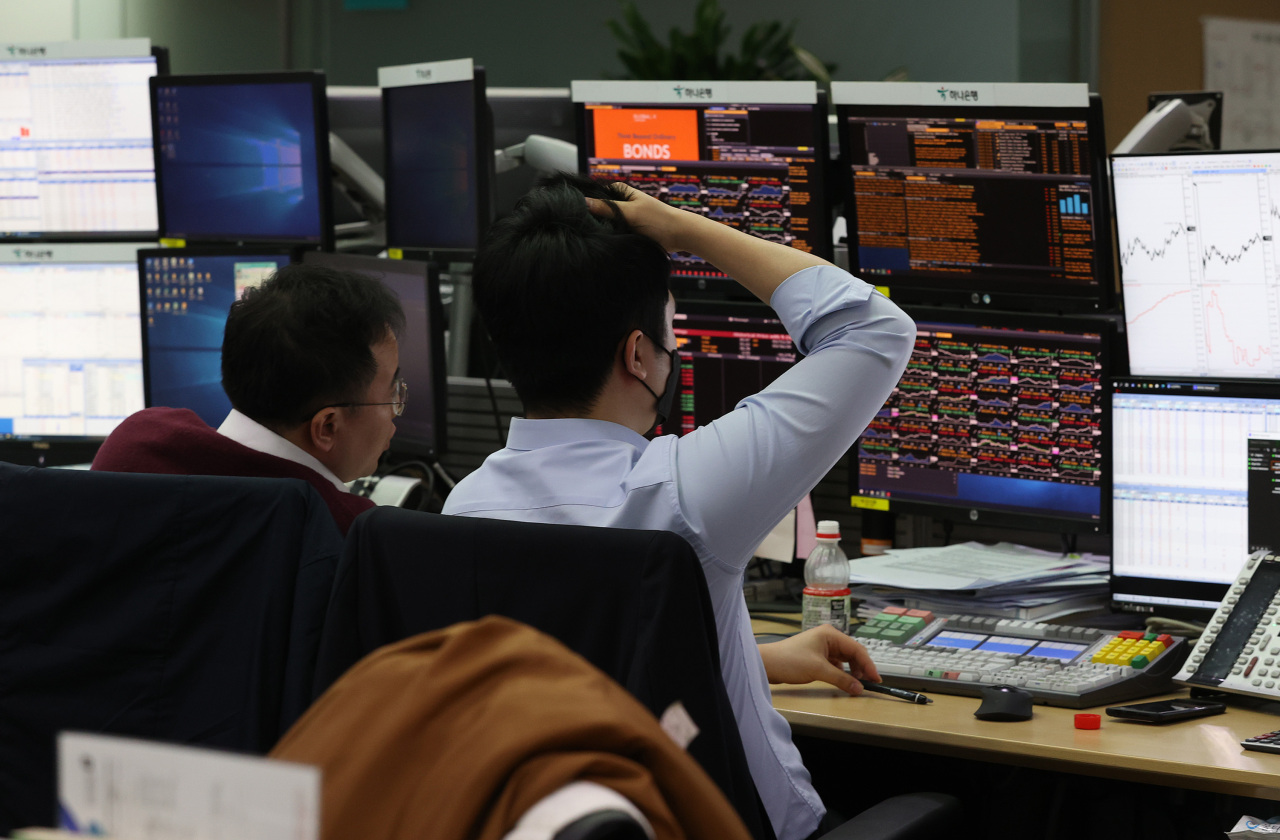Seoul markets sink as monetary easing fails to quell virus fears
FSC eyes contingency plan to ease market’s further decline
By Jie Ye-eunPublished : March 17, 2020 - 17:25

South Korean stocks declined again Tuesday as surprise monetary policies around the globe failed to soothe market jitters over the economic fallout from the new coronavirus pandemic. The Korean won also continued to sink against the US dollar.
The benchmark Kospi opened sharply low at 1,640.84 -- down 74.02 points, or 4.32 percent, from the previous session. The index even plummeted to 1,637.88 points in early morning, then inched up to close at 1,672.44.
Foreign investors offloaded a net 1.093 trillion won ($878.8 million) worth of stocks, weighing down the main bourse. They also posted a net-selling for the ninth consecutive trading session since March 5.
The tech-heavy Kosdaq also began at 488.02 -- down 16.49 points, or 3.27 percent, from the previous session. The index fell to 483.51 points in early morning -- marking the lowest since Dec. 20, 2013 with 488.41 points -- then suddenly headed south as foreign and institutional investors scooped up undervalues shares, closing at 514.73.
The local currency closed at 1,243.50 won against the greenback -- down 17.50 won from the previous session’s close. It was the first time to close, peaking over 1,240 won per dollar, since June. 11, 2010 with 1,246.10 won.
The tech-heavy Kosdaq also began at 488.02 -- down 16.49 points, or 3.27 percent, from the previous session. The index fell to 483.51 points early morning -- marking the lowest since Dec. 20, 2013 with 488.41 points -- then suddenly headed south as foreign and institutional investors scooped up undervalues shares.
Amid growing concerns over the COVID-19 virus, the Bank of Korea slashed by 50 basis points to a record low of 0.75 percent a day earlier. The decision was followed hours after the US Federal Reserve took the drastic step of slashing its key interest rate to near zero and rolled out a quantitative easing program worth $700 billion.

Despite a set of bold monetary easing policies announced globally, the stock market rout has yet to show signs of a let-up, not just in Seoul but also major stock indexes in the US, reflecting investors’ growing fear over further economic turmoil from the virus outbreak.
The Dow Jones Industrial Average on Monday surrendered 12.93 percent, suffering its worst daily plunge since the “Black Monday” crash in October 1987. The S&P and Nasdaq also plummeted 11.98 percent and 12.32 percent, respectively on the same day.
Amid the endless market slump, Korea’s financial authorities eye further extreme measures such as shortening stock trading hours and setting limit on daily fluctuation rate to stabilize chaotic volatility.
The Financial Services Commission held an emergency meeting Tuesday and its Chairman Eun Sung-soo asked to get ready for contingency plan in a belt-and-braces approach, from taking unprecedented action promoting financial stability to stabilizing stock market supply.
Bond market stabilization fund, which raised 10 trillion won during the 2008 global financial crisis to relieve credit crunch and expand demand basis, was reviewed during the meeting. It created a temporary positive impact on brokerages-related stock with high proportion of bonds.
Primary collateralized debt obligation fund and financial stability fund were also reviewed as ways to settle down the market. The FSC plans to hold daily market inspection meetings before stock market opens until the market gets settled.
“We’re preparing for various measures to ease the local stock market. So far, we’ve included shortening stock trading hours and setting limit on daily fluctuation rate as part of our contingency plan, but those are for extreme situations. The market is not at that stage at the moment,” a FSC official said.
By Jie Ye-eun (yeeun@heraldcorp.com)








![[Graphic News] More Koreans say they plan long-distance trips this year](http://res.heraldm.com/phpwas/restmb_idxmake.php?idx=644&simg=/content/image/2024/04/17/20240417050828_0.gif&u=)
![[KH Explains] Hyundai's full hybrid edge to pay off amid slow transition to pure EVs](http://res.heraldm.com/phpwas/restmb_idxmake.php?idx=644&simg=/content/image/2024/04/18/20240418050645_0.jpg&u=20240419100350)






![[From the Scene] Monks, Buddhists hail return of remains of Buddhas](http://res.heraldm.com/phpwas/restmb_idxmake.php?idx=652&simg=/content/image/2024/04/19/20240419050617_0.jpg&u=20240419175937)

![[KH Explains] Hyundai's full hybrid edge to pay off amid slow transition to pure EVs](http://res.heraldm.com/phpwas/restmb_idxmake.php?idx=652&simg=/content/image/2024/04/18/20240418050645_0.jpg&u=20240419100350)

![[Today’s K-pop] Illit drops debut single remix](http://res.heraldm.com/phpwas/restmb_idxmake.php?idx=642&simg=/content/image/2024/04/19/20240419050612_0.jpg&u=)